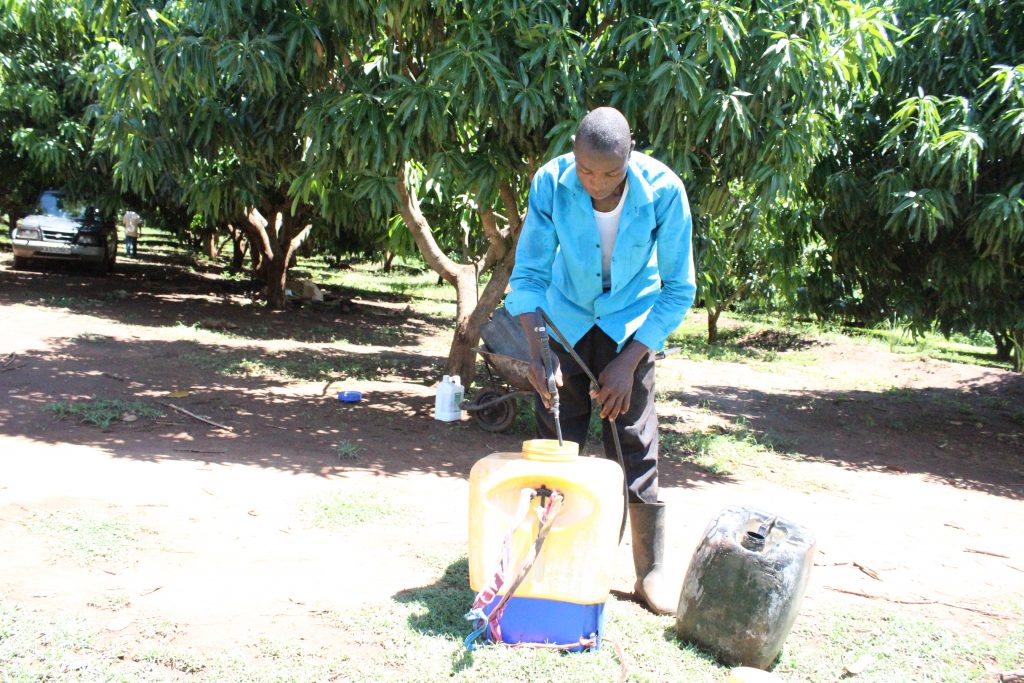
Like many mango farmers in Elgeyo Marakwet County, Mzee Francis Kiplagat dreads the mention of the word fruit fly, saying the insect is a menace that had consistently robbed him of huge fortunes whenever his trees bore fruits.
For years, the fly had been a set back to his agricultural venture of passion since his tender age, that even saw him sacrifice his career as a police officer.
Kiplagat quit being an Administration Police (AP) officer in 1969 less than a year after getting recruited to the force so that he could peacefully pursue what his heart desired most – farming.
“Nilikuwa napenda shamba (I used to love farming) since I was young and felt the new job would limit me hence I chose to go back home. I began with vegetables, groundnuts and partially did indigenous mango varieties until 1980,” he narrates.
To enhance his skills, Kiplagat travelled to Tana River, Kitui, Embu and Machakos where mango farming was thriving and applied lessons learnt in his farm located at Chemurgui area in Elgeyo Marakwet County where he planted four improved mango varieties in a 10 acre piece of land.
“I used to wonder why mangoes from different regions I visited were huge. I later learnt that they were planting improved varieties that are high yielding and drought resistant. I adopted the new varieties and in three years, I got massive yields that I sold to the local markets and this made me want to expand the venture to improve earnings,” he adds with a beaming face.
Currently, Kiplagat has a plantation of 50 acres of mature mangoes. He added 20 acres to the initial 10 in the year 2000, added another 20 in 2006 and currently he has prepared another 10 acres that will eventually bring total mango acreage to 60.
“Everything was going on well then as yields were massive and consistently met the demand of the middlemen from Nairobi, Eldoret and mostly Nakuru who export them and I thought it would be more profitable if I sought for a foreign market where I could export directly,” he says.
He says before he could get access to the foreign market he realized something in the farm where his fruits were dropping before they got ripe while others were rotting.
“Clients who used to take bulks of my yields began raising complaints saying my fruits looked attractive from outside but had insects and were rotten inside. I could no longer sell up to 80 per cent of my yields that were rotting as I watched helplessly,” he adds.
Kiplagat said together with other farmers around the area realized there was an insect-fruit fly that was causing the havoc and tried all sorts of insecticides to tame the dreadful insect but nothing changed.
Magrina Michir, also a farmer from Tot location in Elgeyo Marakwet who quit his job as a typist to venture into mango production 30 years ago shares the same story as Kiplagat. He said their dream to access the lucrative European Union (EU) market got more elusive due to the presence of the fruit fly pests that cost them huge losses.
“I began getting a maximum of 100 good fruits that would be accepted in the market from a tree that used to produce 500 mangoes per season. We also realized that the chemicals we were using to try to contain the insects was not accepted in European Markets because of strong regulations,” she says.
This, she notes, saw a drastic drop in earnings from an average of Sh 10,000 to Sh 2,000 on harvest after a season. The crop fruits twice annually.
According to Michir who upgraded from indigenous mango varieties 15 years ago and has 800 trees in a 10 acre piece of land, their fruits didn’t meet international parameters that emphasized on integrated pest management strategies and minimal use of chemicals.
Fruit flies are a quarantine pest under the EU market hence yields that are infected or suspected to be infected by them cannot be exported to that market that purchases at least 80 per cent of Kenya’s horticultural export.
Kiplagat says a turnaround to their problems came when he carried six mangoes to a farmers’ training session organized by the Kenya Plant Health Inspectorate Service (KEPHIS) in Eldoret in November 2015, to seek expert view on how to reduce losses and regain access to the lucrative western markets.
“After the training, Kephis officers took the mangoes to their laboratories and later told us that our situation was manageable and pledged to assist us to overcome the pests through a biological means and brought us ‘magical traps’,” explains Kiplagat who was once awarded the Permanent Presidential Award on Soil Conservation by retired President Daniel Moi.
Alfred Omusuya, the regional manager Kephis Kitale branch that covers nine counties including Elgeyo Marakwet said the mango farmers’ sad tale of the fruit flies prompted them to become part of the solution to the menace.
He says together with other stakeholders like Smart Market Access Programme (SMAP) organized seminars and installed and monitor fruit fly traps in mango farms in a bid to achieve International Standards for Phytosanitary Measures (ISPM) endorsed by the Commission on Phytosanitary Measures in April 2006.
“Fruit flies are key pests for many countries as they can cause damage in fruits and restrict access to international markets, it is our responsibility to ensure that we achieve ISPM 26 which is specific on creation of pest free areas in a bid to regain lost international markets,” observed Omusuya.
Jane Boit, Kephis Eldoret Office Director says they chose Chemurgui in Keiyo North, Koimur in Keiyo North and Sambalat in Marakwet East areas for piloting the creation of Pest Free Areas (PFA) with the main objective of regaining the lucrative EU Market, adding that the trap has done magic to the affected farms.
The magic tiny trap
“Last year, the farm was filled with the stench of rotting mangoes and we were afraid of selling because clients would come back complaining we sold them spoilt fruits, but things have changed since Kephis and SMAP brought traps,” says Silas Turchi another farmer.
According to Boit, the jar like trap with a lid and punched holes on the sides to allow entry of insects is laced with a pheromone- a chemical an animal produces that changes the behavior of another animal of the similar species.
“The pheromone attracts males within a radius of a kilometre that rush to the trap thinking they are heading to females for mating, but immediately die after getting into the jar which has a poisonous chemical. The death of males reduces fertilization of females which lay 300 eggs in their lifetime hence ultimate eradication of the pests,” said Boit.
Mr Omusuya boldly stated that the three areas are likely to be declared Pest Free Areas (PFAs) hence farmers from these locations could see their produce accepted in the EU and US markets that pay lucrative premium price of not less than two dollars per fruit as compared to the local prices of between Sh15 and 20 and the Middle East that offers Sh29.
“The statistics we have from core areas where we have been focusing on one large scale farmer and those surrounding them to create a buffer zone are encouraging. Our fruits would be regaining the EU and US markets this year,” he added.
Elgeyo Marakwet County Executive in Charge of Agriculture Shadrack Yatich said over 5000 hectares of land in the area is under mango plantations with an estimated production of 75,000 tonnes per single season.
“The fruit fly eradication success story will make more farmers get into the venture with over 3600 households currently having at least one mango tree, we are giving local farmers a subsidy of fruit seedlings where they get one more stem for every purchase at an affordable cost of Sh100,” said Yatich.
Popular mango species improved through grafting that are grown by local farmers include Apple, Van Dyke, Ngowe, Tommy Atkins, Kent, Boribo, Chino, Maya, Maskio ya Punda, Zin, Glen and Hayden.



